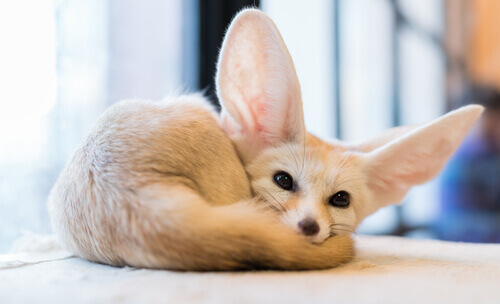Is It a Good Idea to Have a Fennec Fox as a Pet?


Written and verified by the vet Eugenio Fernández Suárez
The fennec fox is a very striking animal, which makes you fall in love with it at first sight. Surely you’ve seen videos on social networks, which proves what an adorable animal it is. Nevertheless, we mustn’t forget that it’s a wild specimen. In this article we’ll examine whether it’s advisable to have a fennec fox as a pet.
Legal issues
Nowadays, this endeavor is legal, and we highlight this because it’s been proposed on more than one occasion to classify it as an invasive species, which would prohibit its purchasing or possession. Although it’s currently possible, the legislative change is more than likely. Therefore, it should make us think about whether it’s a good idea to have a fennec fox as a pet.
Even if some wild species such as iguanas or parrots may live in our house, the truth is that they’re wild animals, and it’s unnatural for them to live in captivity.
Even if owning one is legal, the truth is that their sale isn’t legalized. Therefore, we can end up buying an animal captured illegally in its country of origin, which is clearly immoral.
Regardless of sellers guaranteeing their origins, it’s very common for them to have been illegally captured in the wild. Unfortunately, it’s relatively cheap to capture and transport this species. Therefore, we may even be committing a crime by buying it, especially on the internet.

The desert nights of the fennec fox
One of the main reasons for not keeping a fennec fox as a pet is the climate. Its ears, fur and physiology make it fit for the desert climate, and the extreme temperatures and lack of water. That’s why, as a pet in areas such as Europe and the United States, it suffers from renal and thermoregulatory problems.
Its behavior is another reason why the fennec fox is an ill-suited pet. As a nocturnal animal, in theory, it shouldn’t be active during the same hours that we’re awake.
That’s why artificial light and the change in its circadian rhythms make the fennec fox prone to diseases of hormonal character, similar to the adrenal disease in the ferret. It’s important to stress that there’s little veterinary experience regarding this animal. Consequently, there may be very few solutions after disrupting the circadian rhythms of this species.
Is it a good idea to have a fennec fox as a pet?
In general, carnivores spend most of their time in the wild searching for prey. When we take away their opportunity to search and hunt their own food, they get bored most of the day, and usually have stereotypical behaviors. This would also affect the fennec fox should we choose to have it as a pet.

Environmental enrichment could mitigate these problems. However, the fennec fox must have, above all, a large shelter with sand and rocks, where it can have its burrow with outside access.
In addition, the facility must have a cemented base to prevent it from escaping by digging. That’s why it’s unfeasible for a fennec fox to be adequately cared for when kept as a pet in a regular house.
Note that, even if it doesn’t have the possibility of hunting, the use of dead prey in the form of day-old chicks or rats seems indispensable for its welfare. The welfare and health implications of giving it only feed are unknown.
In houses or apartments, the fennec fox often ends up getting frustrated. Consequently, it unloads this frustration on house furnishings, and can even become aggressive. Living with humans can be a bad experience for the fennec fox, just as it is for the meerkat.
Conclusion
As adorable as it may seem, and regardless of how much we commit to taking care of it, the truth is that it’s very difficult for a fennec fox to live happily as a pet. In short, only professionals or specialized centers should keep it. Definitely, this species is better off in the desert, where it belongs.
All cited sources were thoroughly reviewed by our team to ensure their quality, reliability, currency, and validity. The bibliography of this article was considered reliable and of academic or scientific accuracy.
- Wacher, T., Bauman, K. & Cuzin, F. (2015). Vulpes zerda. The IUCN Red List of Threatened Species 2015: e.T41588A46173447. https://dx.doi.org/10.2305/IUCN.UK.2015-4.RLTS.T41588A46173447.en.
- Dempsey, J. L., Hanna, S. J., Asa, C. S., & Bauman, K. L. (2009). Nutrition and behavior of fennec foxes (Vulpes zerda). Veterinary Clinics of North America: Exotic Animal Practice, 12(2), 299-312.
This text is provided for informational purposes only and does not replace consultation with a professional. If in doubt, consult your specialist.